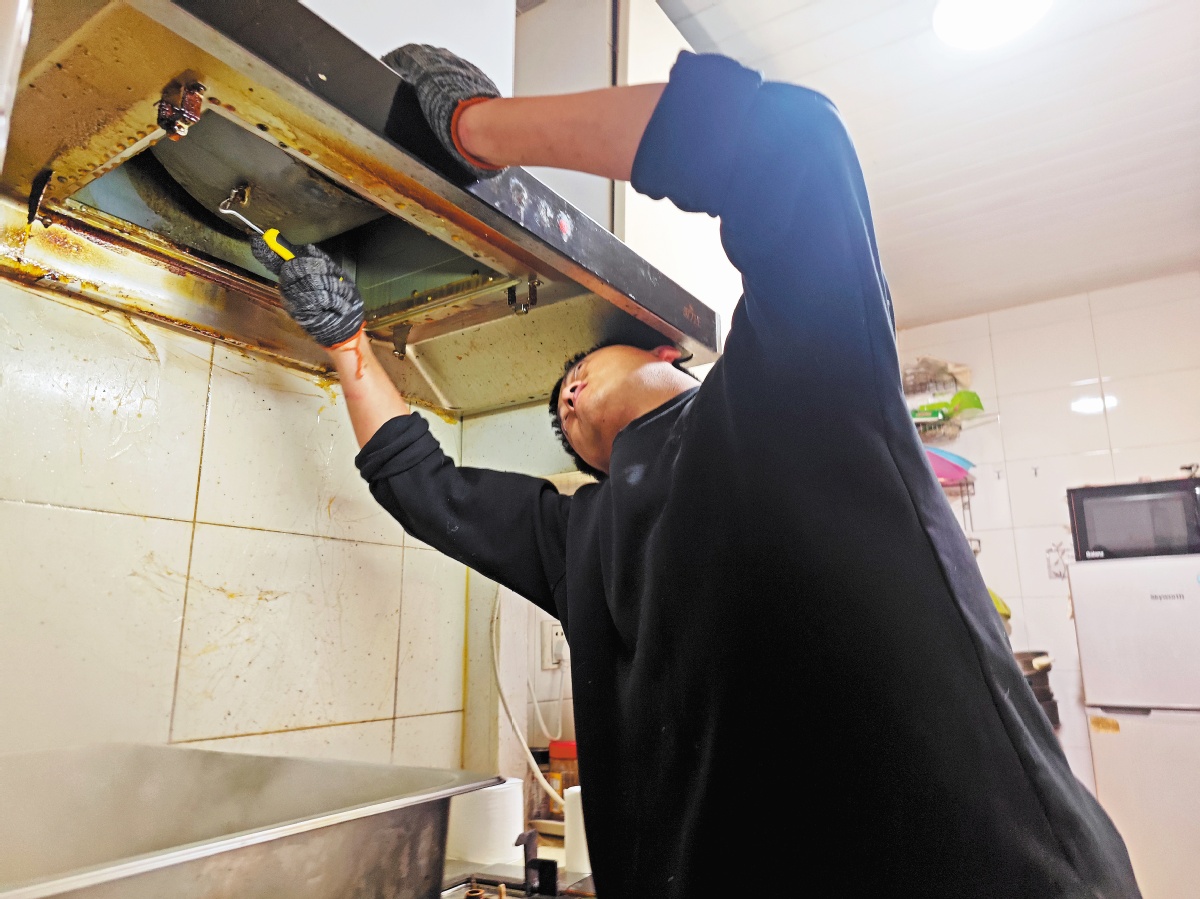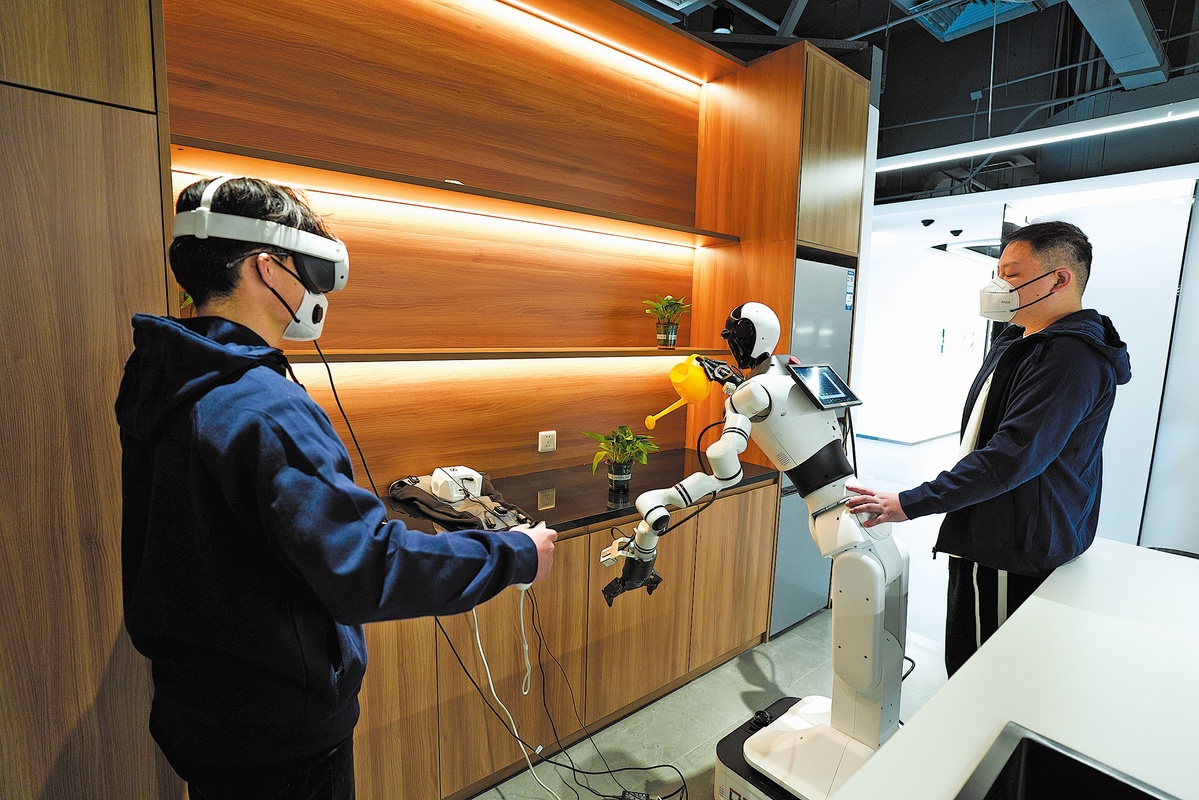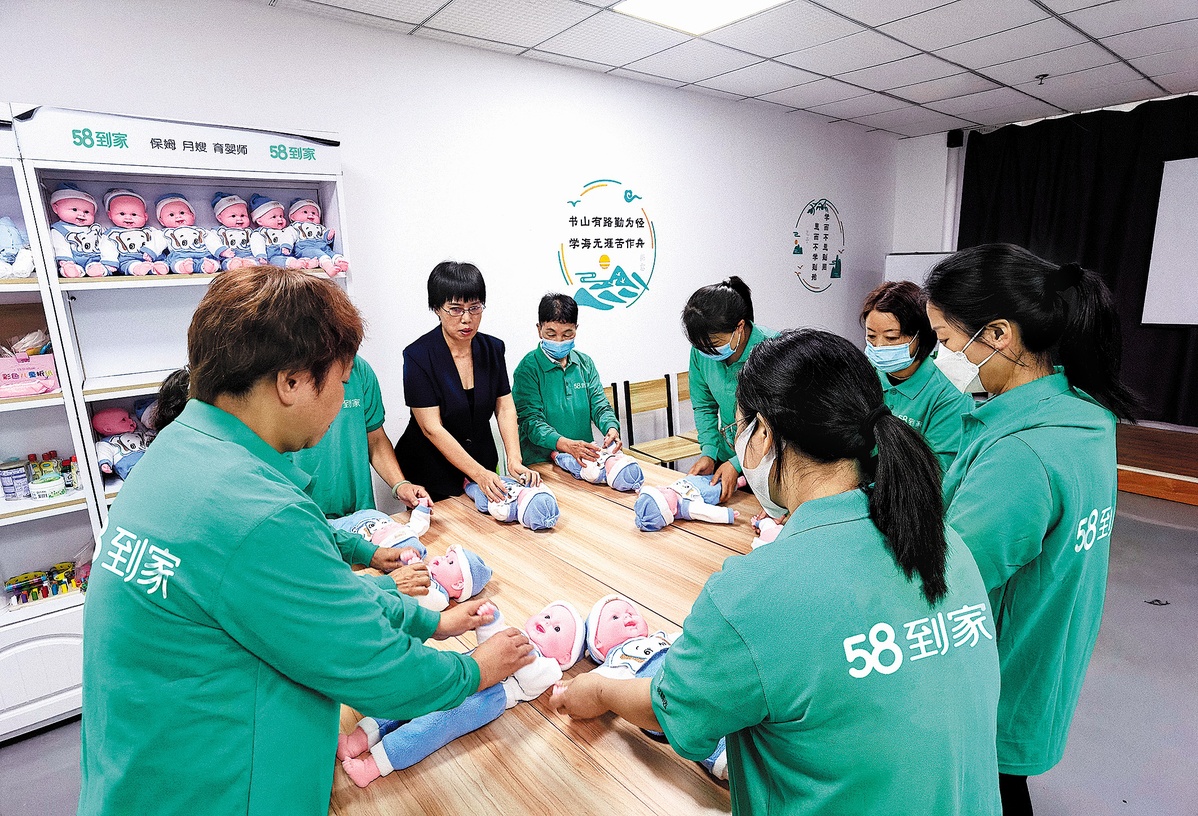Domestic helpers, nannies, butlers all in high demand
Millions of middle-income Chinese families seeking hired assistance to ease life's burdens


Stella Tian, a 33-year-old office worker in Beijing, has two toddlers — a 1-year-old and a 3-year-old — and employs two nannies to help look after the children and simplify her life, as she and her husband have hectic work lives.
"I have changed my nannies a few times. Some were not professional enough and didn't get along well with my family members, and some had other plans that came up. It's not easy to find a suitable nanny for the long term," Tian said.
Like Tian, demand for homemaking services among Chinese urban families is surging, and trained domestic helpers, nannies and nurses for the elderly are in great demand, promising to incubate a market expected to reach 1.3 trillion yuan ($181.1 billion) in 2026.
The forecast, made by the Ministry of Commerce's Department of Trade in Services and Commercial Services, together with data analysis provider iiMedia Research, said China's household services sector has maintained rapid growth.
Millions of middle-income Chinese families, especially those with young children and aging family members, are seeking professional helpers to ease life's burdens, while it has sometimes been difficult for them to find satisfactory professional homemakers. Compared with diversified and high-quality demand, there are still problems such as a shortage of professional supply and nonstandard industry development.
It is estimated that there is a shortage of over 20 million domestic workers in China, according to the Ministry of Human Resources and Social Security. Demand for household services is no longer limited to daily chores, as online shopping and food deliveries have made it increasingly convenient for consumers, and they have indicated demand for higher-level specialized services, industry insiders said.
To address such issues and further boost consumption, China has published a guideline to further promote the development of its home-based services sector, such as housekeeping, eldercare and childcare services, by expanding the scale and upgrading service quality. Such efforts aim to cultivate new growth points for the country's services consumption, according to the document released by the Ministry of Commerce and eight other entities in late April.
A series of measures have been proposed to improve the quality of household services supply, promote convenient consumption and optimize the consumption environment of the sector, according to the guideline.
For example, the government will encourage household service enterprises to expand into emerging service areas such as professional deep cleaning, indoor air treatment and nutritional consulting, and strengthen integrated development with sectors such as home furnishings and interior decorating, the guideline said.
In addition, social capital is encouraged to flow into the household services sector, and local governments may include homemaking occupations into local shortage directories. It is also suggested that more employment-oriented domestic service training should be offered, the guideline said.
"Household services are an important sector that helps promote consumption, benefits people's lives and stabilizes employment," said Kong Dejun, director of the Department of Trade in Services and Commercial Services at the commerce ministry.
"China will continue to expand domestic demand, strengthen supply-side structural reform, give full play to the country's human resources advantages and cultivate new growth points of service consumption," Kong said.

Currently, China has over 30 million household service providers such as nannies and housekeepers. Last year, total revenue of the sector stood at 1.23 trillion yuan, up 6 percent year-on-year, the ministry said.
Women are the main practitioners in the household services industry. The All-China Women's Federation said the sector is showing a growing trend that practitioners are becoming younger and more professional, and it would continue to help promote the digitalization of the sector.
On the demand side, the need for babysitters and caregivers for the elderly is huge. The number of those aged 60 and above has exceeded 300 million, and the over-65 population has topped 220 million. In addition, China has some 30 million youngsters aged below three, according to the National Bureau of Statistics.
China will cultivate a group of distinctive brands in the homemaking sector and foster more platform-based companies to help match supply and demand.
"We will guide various regions to implement employment and entrepreneurship policies, and homemaking personnel should enjoy tax incentives and social security subsidies upon laws and regulations," said Luo Shoufeng, deputy head of the department of migrant workers' jobs at the Ministry of Human Resources and Social Security.
Catering to such demand, a number of platform-based homemaking service companies such as 58.com and Ayibang have continued to develop their business to raise the efficiency of supply-demand matching.

Beijing-based life services platform 58.com said some 2.6 million homemakers have registered on the platform, and all of them will undergo pre-work training to ensure the provision of standardized and professional services.
It has launched more than 200 training bases nationwide, integrating online teaching and offline training sessions, and the company became the first in the sector to introduce VIP membership services for consumers.
"For emerging household services demand such as deep cleaning, clutter control and storage, pest management and home management services, we have launched more than 10 professional courses. Those include courses that we developed with entities in Japan and Hong Kong together, in an aim to foster more high-quality household service providers," said Li Zijian, president of 58.com's domestic business.
In densely populated first-tier cities such as Beijing, Shanghai and Guangzhou, Guangdong province, demand for homemaking services has been the highest, 58.com found.
Among different types of services, demand for household cleaning, home appliance cleaning, nannies and maternity matrons — or yuesao, who mainly care for newborns — has been the highest, the company said.
Most consumers choose to hire day-shift nannies and part-time workers to assist with household chores and cooking. Demand for eldercare and childcare has continued to grow. In May, demand for nannies and eldercare service providers jumped 83 percent and 48 percent on a yearly basis, respectively.
For deep cleaning of homes, consumers pay more attention to the thorough cleaning of kitchen oil stains, bathroom tiles and hard-to-clean corners and under spaces. For home appliances, cleaning demand for air-conditioners, range hoods and washing machines has been the highest. In May, demand for air-conditioning cleaning climbed by 76 percent month-on-month and 26 percent year-on-year.
"Urbanites have shown an increasingly higher health awareness, and a growing number of consumers choose to clean their airconditioners before the arrival of summer to reduce respiratory diseases," Li said.
Meanwhile, China's high-net-worth families are becoming younger, and they are showing a growing demand for hiring private butlers as they embrace such a trend in Western countries, and more college graduates, including those who have studied abroad, are looking to butlers as career choices.
Private butlers usually act as senior life consultants for their employers' core family management issues. Unlike ordinary housekeeping service personnel, private butlers usually need to understand advanced family affairs.
They usually speak one or two foreign languages, understand children's educational planning, and have knowledge about issues such as nutrition, luxury products and ironing. They also cook multiple cuisines and are skillful at safeguarding and risk management, according to Meiyinghui Family Service Co Ltd, a Beijing-based butler management company.
The average salary of a private butler is about 200,000 yuan to 400,000 yuan annually for those who have one or two years of work experience, and the salary grows as they master more skills, thus attracting many people to engage in this profession.
"Employers would like to hire young butlers, including college graduates. The demand has become higher, as more families have a growing awareness of hiring butlers. Besides, many families have been quite busy with business matters after the COVID-19 pandemic, and they need to hire someone for household management," said Zhang Ran, founder and president of Meiyinghui Family Service.
"Now, 70 percent of butlers in China are females. A lot of graduates and qualified people are still hesitating about engaging in this profession, and the supply of butlers is seeing a shortage. We plan to host a session to introduce the career path of the profession and attract more graduates," Zhang said.
Besides major cities such as Beijing and Shanghai, some families in second-tier cities such as Qingdao in Shandong province and Shijiazhuang, Hebei province have also indicated high demand for hiring butlers, the company found.
Butlers usually need to take a few months of training classes before they start working. Li Siwen is a teacher who conducts training sessions for butlers, earning a master's degree in hotel management from the University of Manchester.
"I'm quite interested in this sector. I used to work in the human resources management department of a company, and this job is similar. I mainly teach students psychology, color matching, sorting and organization of items, and business etiquette," Li said.




































